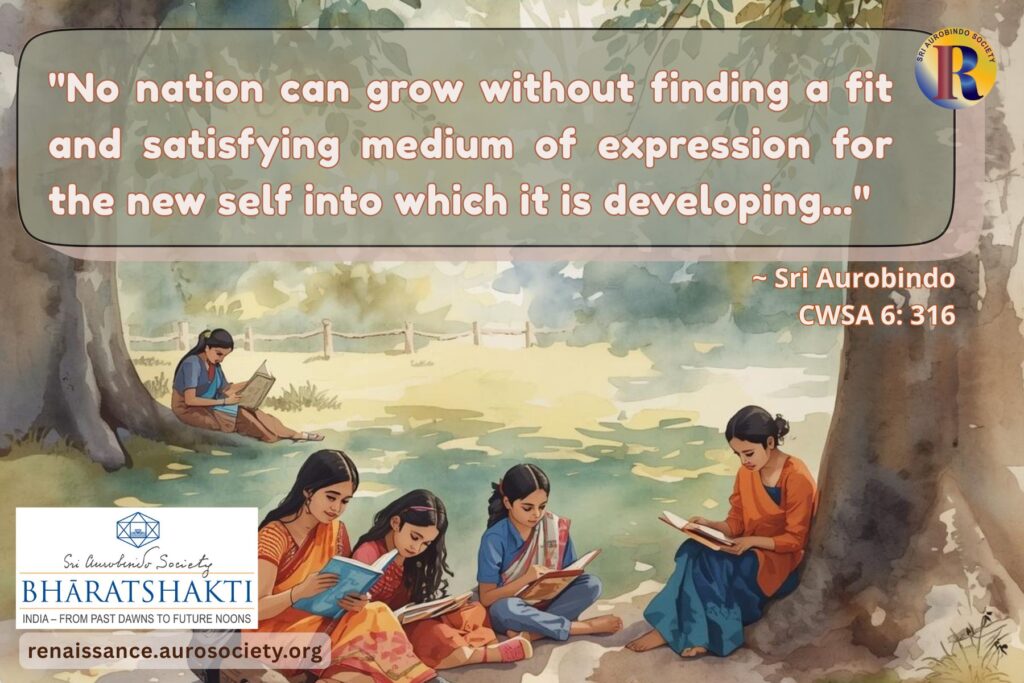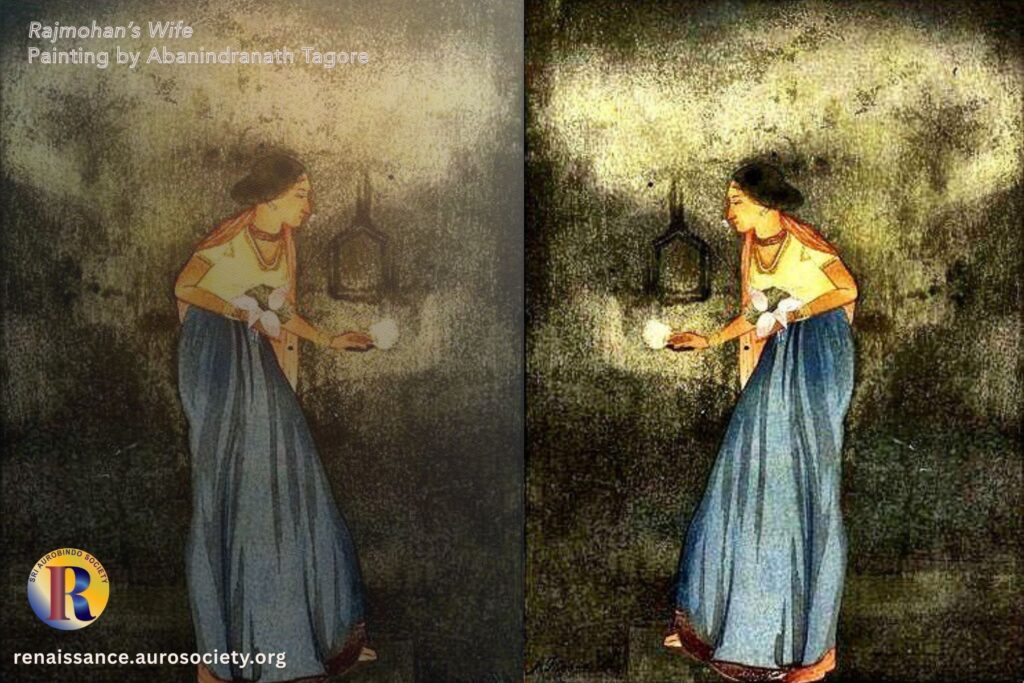Volume V, Issue 6-7
Author: The Mother
Editor’s Note: In this part, the focus is more on the control of speech in intellectual and spiritual domains. Sincere aspirants will find here very helpful guidance from the Mother. As in the first part, here also we have added some sub-headings for easier online reading.
Continued from PART 1
Speech in Intellectual Domain
There are also all the words that are uttered to express ideas, opinions, the results of reflection or study. Here we are in an intellectual domain and we might think that in this domain men are more reasonable, more self-controlled, and that the practice of rigorous austerity is less indispensable. It is nothing of the kind, however, for even here, into this abode of ideas and knowledge, man has brought the violence of his convictions, the intolerance of his sectarianism, the passion of his preferences.
Thus, here too, one must resort to mental austerity and carefully avoid any exchange of ideas that leads to controversies which are all too often bitter and nearly always unnecessary, or any clash of opinion which ends in heated discussions and even quarrels, which are always the result of some mental narrowness that can easily be cured when one rises high enough in the mental domain.
For sectarianism becomes impossible when one knows that any formulated thought is only one way of saying something which eludes all expression. Every idea contains a little of the truth or one aspect of the truth. But no idea is absolutely true in itself.
This sense of the relativity of things is a powerful help in keeping one’s balance and preserving a serene moderation in one’s speech. I once heard an old occultist of some wisdom say, “Nothing is essentially bad; there are only things which are not in their place. Put each thing in its true place and you will have a harmonious world.”
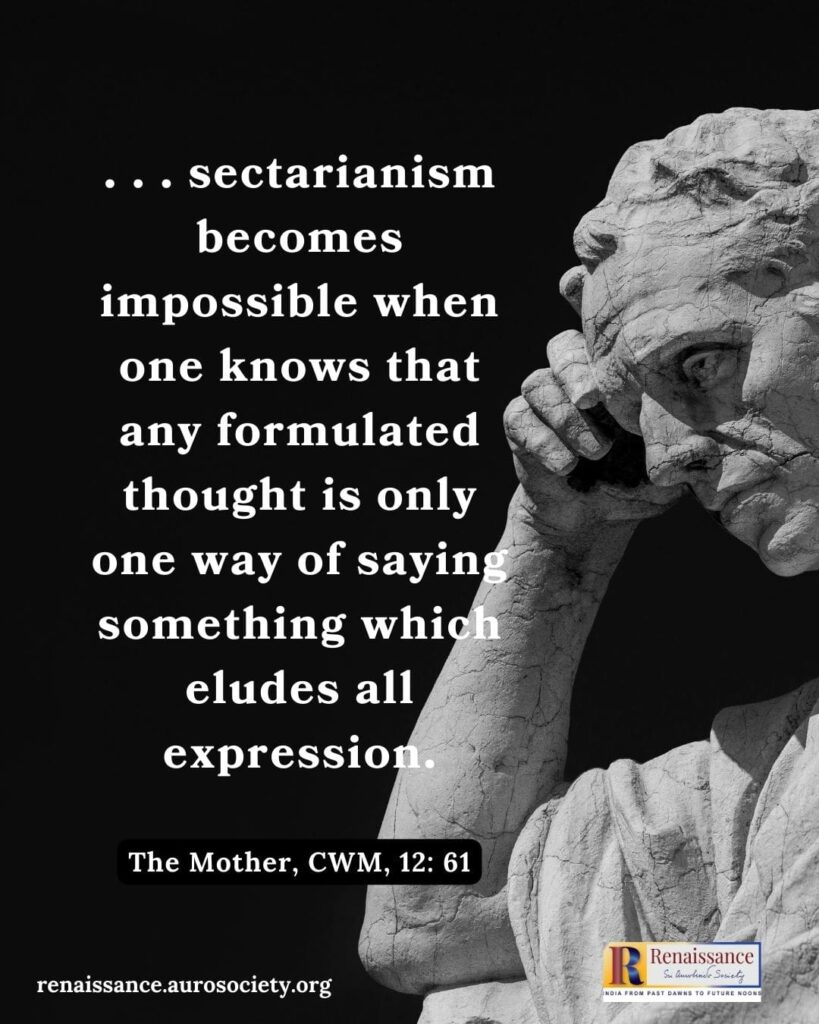
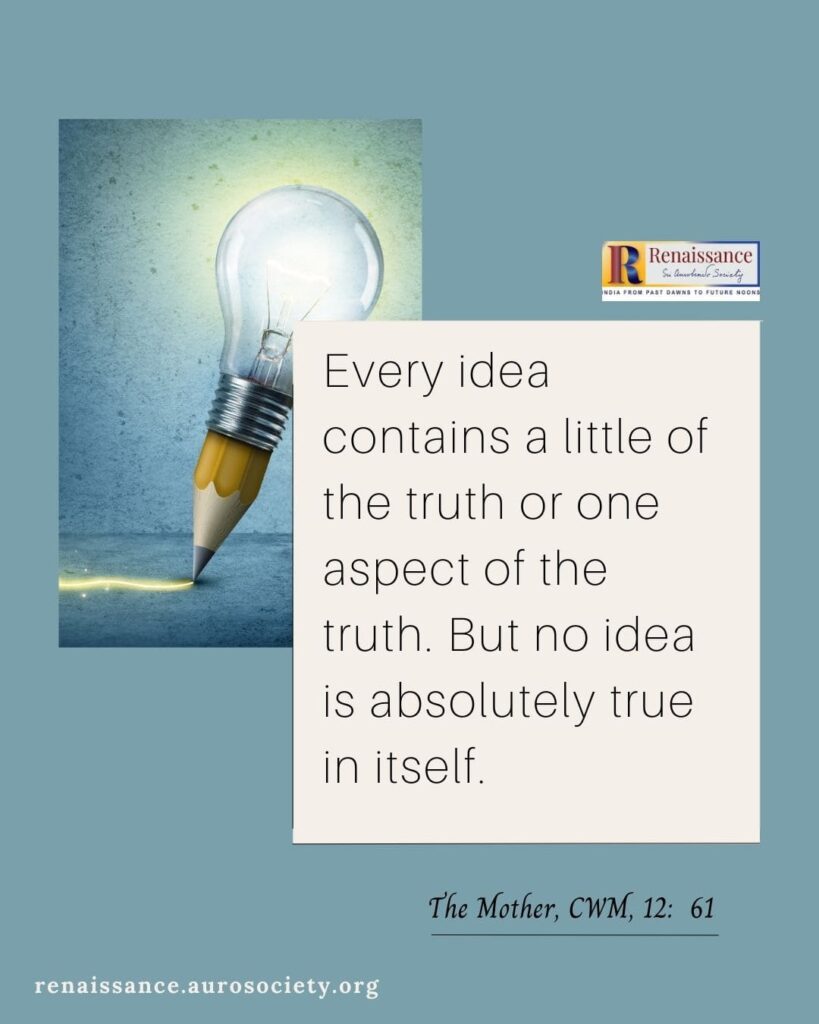
And yet, from the point of view of action, the value of an idea is in proportion to its pragmatic power.
It is true that this power varies a great deal according to the individual on whom it acts. An idea that has great impelling force in one individual may have none whatsoever in another. But the power itself is contagious. Certain ideas are capable of transforming the world. They are the ones that ought to be expressed; they are the ruling stars in the firmament of the spirit that will guide the earth towards its supreme realisation.
Lastly, we have all the words that are spoken for the purpose of teaching.
This category ranges from the kindergarten to the university course, not forgetting all the artistic and literary creations of mankind that seek to entertain or instruct. In this domain, everything depends on the worth of the creation, and the subject is too vast to be dealt with here. It is a fact that concern about education is very much in vogue at present and praiseworthy attempts are being made to make use of new scientific discoveries in the service of education.
But even in this matter, austerity is demanded from the aspirant towards truth.
It is generally admitted that in the process of education a certain kind of lighter, more frivolous, more entertaining productions are necessary to reduce the strain of effort and give some relaxation to the children and even to adults. From a certain point of view, this is true; but unfortunately this concession has served as an excuse to justify a whole category of things which are nothing but the efflorescence of all that is vulgar, crude and base in human nature. Its coarsest instincts, its most depraved taste find in this concession a good excuse to display and impose themselves as an inevitable necessity.
They are nothing of the kind, however; one can relax without being dissolute, take rest without being vulgar, enjoy oneself without allowing the grosser elements in the nature to rise to the surface. But from the point of view of austerity, these needs themselves change their nature; relaxation is transformed into inner silence, rest into contemplation and enjoyment into bliss.
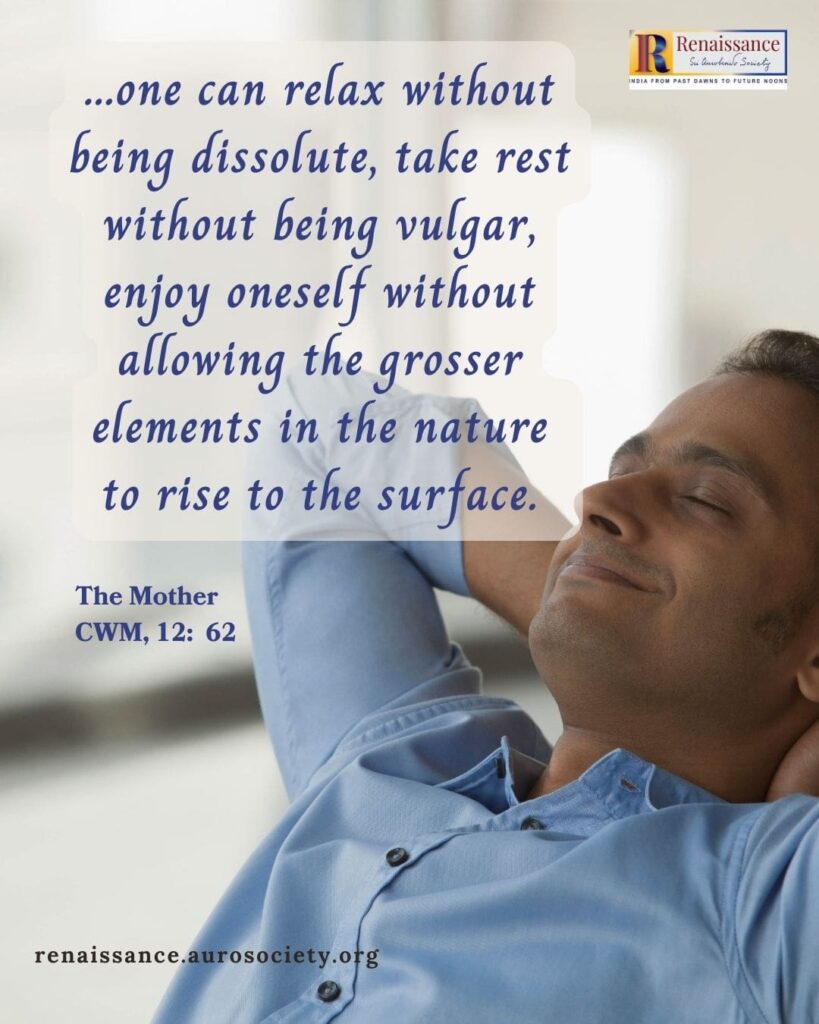
This generally recognised need for entertainment, slackening of effort and more or less long and total forgetfulness of the aim of life and the purpose of existence should not be considered as something altogether natural and indispensable, but as a weakness to which one yields because of lack of intensity in the aspiration, because of instability in the will, because of ignorance, unconsciousness and sloth.
Do not justify these movements and you will soon realise that they are unnecessary; there will even come a time when they become repugnant and unacceptable to you. Then the greater part of human creation, which is ostensibly entertaining but in reality debasing, will lose its support and cease to be encouraged.
Speech in Spiritual Domain
However, one should not think that the value of spoken words depends on the nature of the subject of conversation. One can talk idly on spiritual matters just as much as on any other, and this kind of idle talk may well be one of the most dangerous.
For example, the neophyte is always very eager to share with others the little he has learnt. But as he advances on the path, he becomes more and more aware that he does not know very much and that before trying to instruct others, he must be very sure of the value of what he knows, until he finally becomes wise and realises that many hours of silent concentration are needed to be able to speak usefully for a few minutes.
Moreover, where inner life and spiritual effort are concerned, the use of speech should be subjected to a still more stringent rule and nothing should be said unless it is absolutely indispensable.
It is a well-known fact that one must never speak of one’s spiritual experiences if one does not want to see vanishing in a flash the energy accumulated in the experience, which was meant to hasten one’s progress.
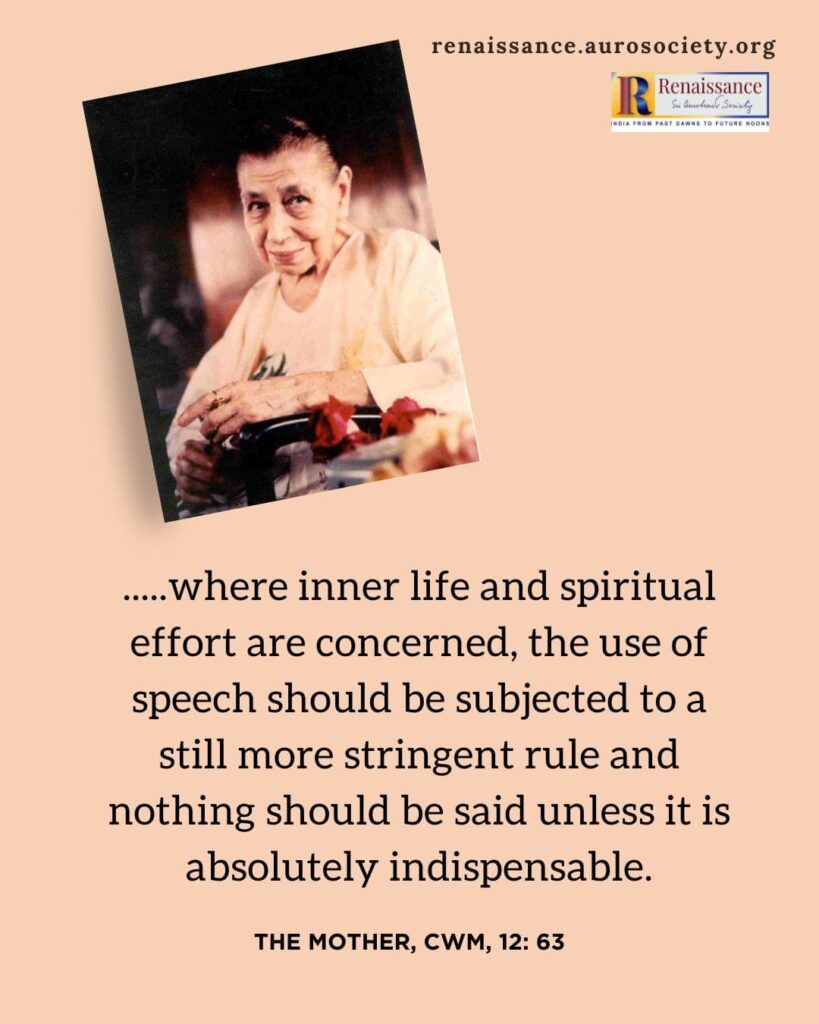
The only exception which can be made to the rule is with regard to one’s guru, when one wants to receive some explanation or teaching from him concerning the content and meaning of one’s experience. Indeed, one can speak about these things without danger only to one’s guru, for only the guru is able by his knowledge to use the elements of the experience for your own good, as steps towards new ascents.
It is true that the guru himself is subject to the same rule of silence with regard to what concerns him personally.
In Nature everything is in movement; thus, whatever does not move forward is bound to fall back. The guru must progress even as his disciples do, although his progress may not be on the same plane. And for him too, to speak about his experiences is not favourable: the greater part of the dynamic force for progress contained in the experience evaporates if it is put into words.
But on the other hand, by explaining his experiences to his disciples, he greatly helps their understanding and consequently their progress. It is for him in his wisdom to know to what extent he can and ought to sacrifice the one to the other. It goes without saying that no boasting or vainglory should enter into his account, for the slightest vanity would make him no longer a guru but an imposter.
As for the disciple, I would tell him: “In all cases, be faithful to your guru whoever he is; he will lead you as far as you can go. But if you have the good fortune to have the Divine as your guru, there will be no limit to your realisation.”
[. . .]
In conclusion, I would say this: if you want your speech to express the truth and thus acquire the power of the Word, never think out beforehand what you want to say, do not decide what is a good or bad thing to say, do not calculate the effect of what you are going to say.
Be silent in mind and remain unwavering in the true attitude of constant aspiration towards the All-Wisdom, the All-Knowledge, the All-Consciousness. Then, if your aspiration is sincere, if it is not a veil for your ambition to do well and to succeed, if it is pure, spontaneous and integral, you will then be able to speak very simply, to say the words that ought to be said, neither more nor less, and they will have a creative power.
~ The Mother, CWM, Vol. 12, pp. 60-64
Concluded
READ PART 1
~ Design: Beloo Mehra


